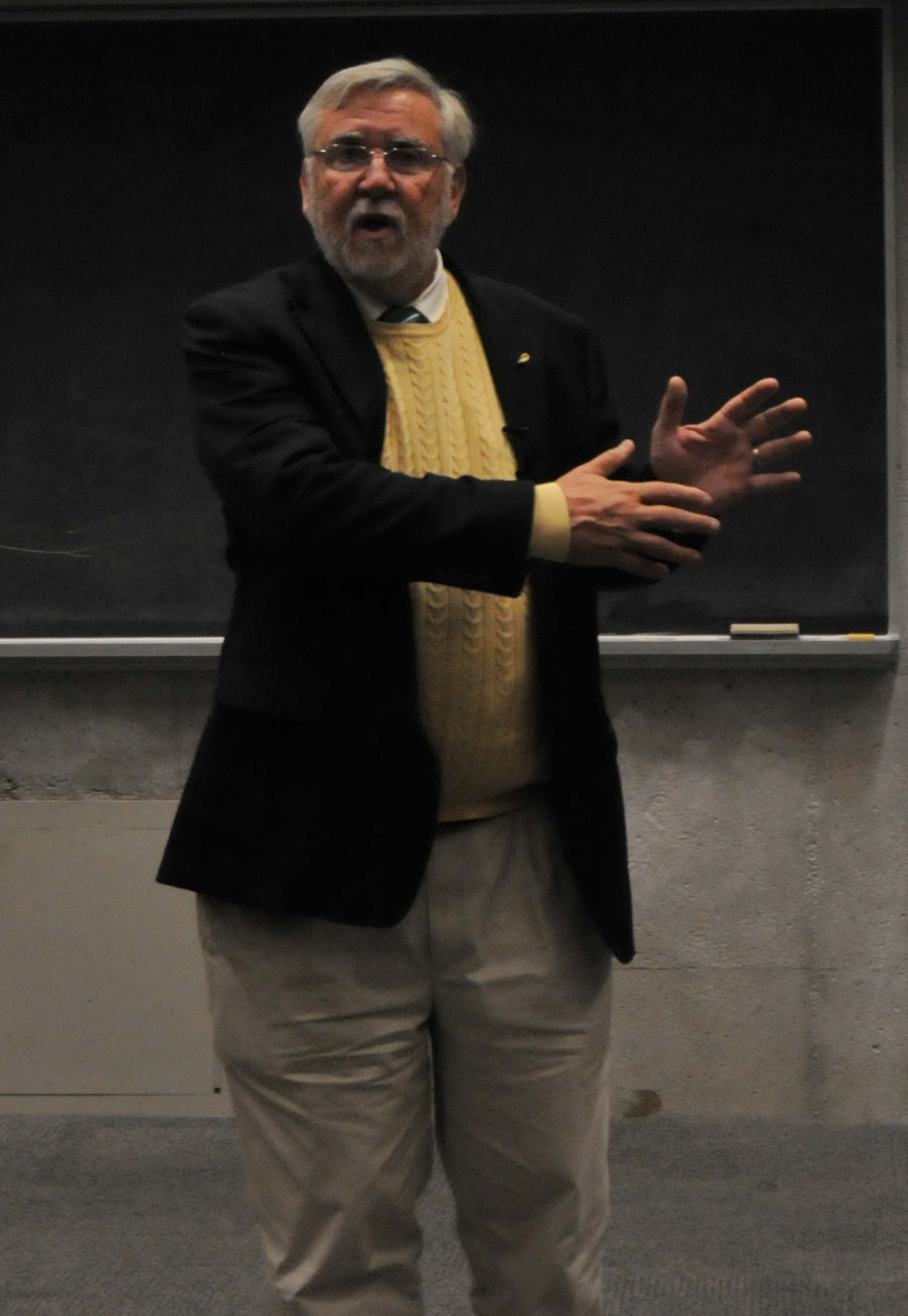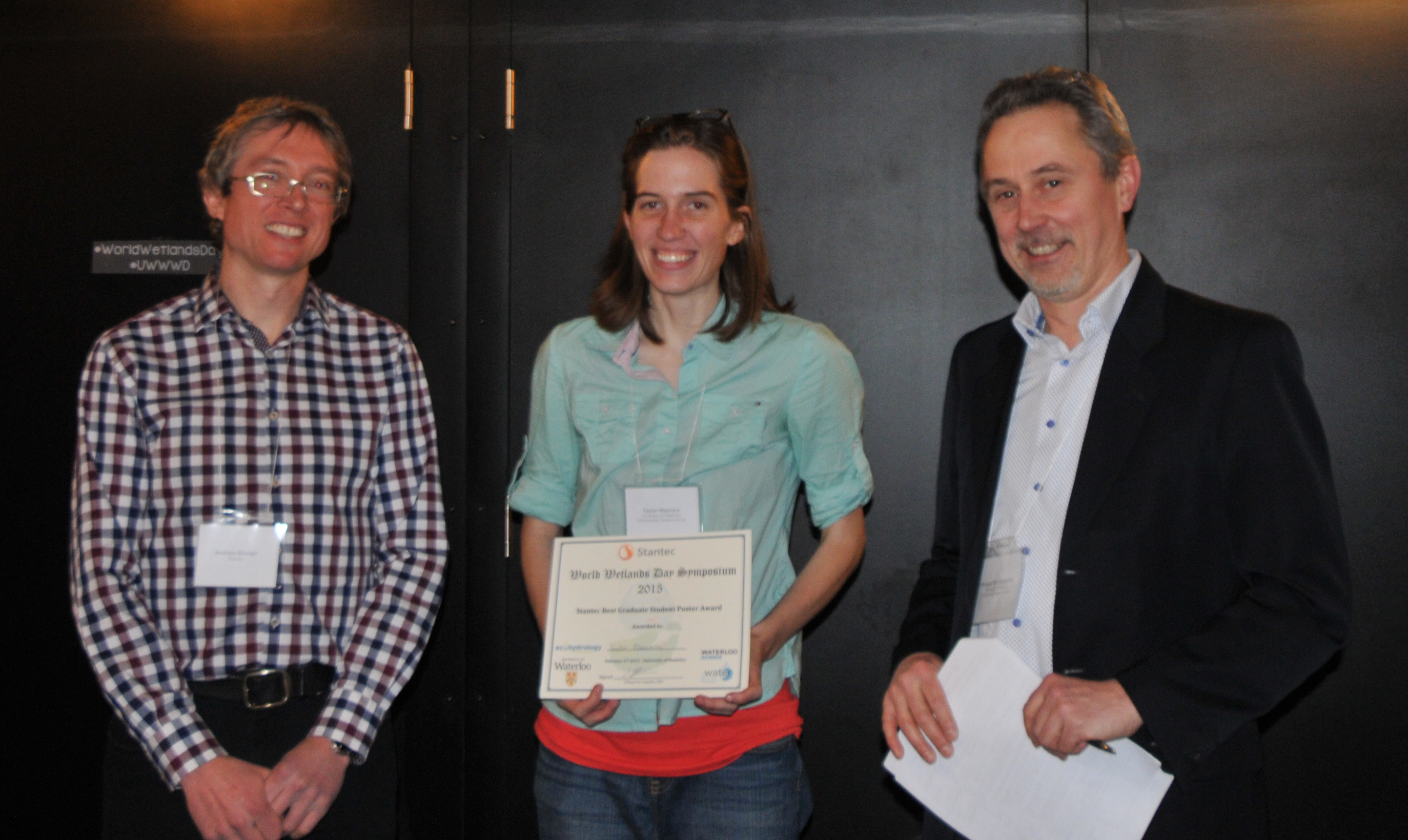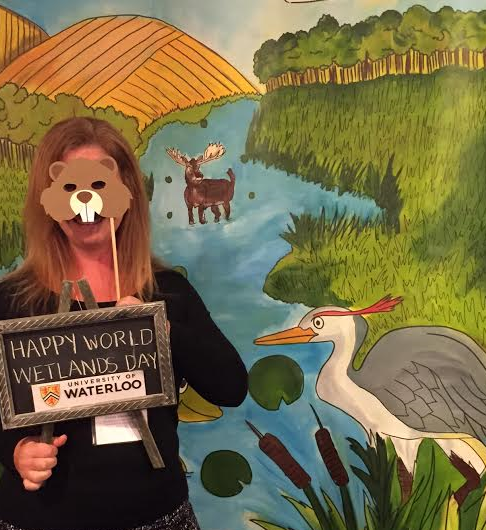Our Motivation
Wetlands are highly productive environments that support biodiversity and provide vital ecosystem services. Wetlands protect against flooding, filter contaminants and excess nutrients, stabilize shorelines, refresh groundwater supplies, and help regulate earth's climate, while lessons learned from natural ecosystems can be used to engineer more effective constructed wetlands. Canada is home to 1/4 of the world's wetlands, spanning 1.5km2 or 15% of Canada's land area. The University of Waterloo is located in southwestern Ontario, an area which has lost 75% of its wetlands due to development, agriculture and pollution in the past 200 years. The Ecohydrology Research Group at the University of Waterloo hosted their 3rd World Wetlands Day to highlight the importance of wetland conservation and how future climate change and human impacts with influence these previous environments.

A group of World Wetlands Day participants at the University of Waterloo, February 2, 2015.
The Event

On Monday February 2nd 2015, the Ecohydrology Research Group in the Department of Earth and Environmental Sciences at the University of Waterloo hosted a one day World Wetlands Day Symposium entitled, "Wetlands for our Future". Due to the arrival of a strong winter blizzard, the planned morning educational activities for middle school students had to be cancelled. However, the afternoon and evening program, consisting of 10 presentations, a poster session and the Distinguished Science Public Lecture went on as announced.
Left: Professor William Mitsch speaking at the Distinguished Science Public Lecture
The symposium brought together scientists, policy experts and young researchers from the University of Waterloo, Wildlife Conservation Society of Canada, University of Saskatchewan, McMaster University and Florida Gulf Coast University, in order to facilitate the dialogue on wetlands-related issues and highlight recent scientific advancements. Themes of discussion included human impacts on wetland health, ecosystem dynamics, management strategies, conservation initiatives, policy planning and economic evaluation of wetland services. Speakers examined wetlands in Canada (northern Ontario, Great Lakes region, Prairie pothole region, northern Alberta) and around the world (Florida Everglades, Mississippi-Ohio-Missouri River Catchment, South America's Tierra del Fuego, and Pakistan's Indus Delta).
The Faculty of Science Distinguished Lecture Series hosted Professor William Mitsch, winner of the 2015 Ramsar Convention Award for Merit and Director of the Everglades Wetland Research Part at Florida Gulf Coast University. Professor Mitsch gave an inspirational talk entitled, "Phosphorus and nitrogen and carbon, oh my! The catchment and global roles of wetlands in mitigating these pollutants". He discussed the importance of wetlands in mitigating anthropogenically driven phosphorus, nitrogen and carbon loading to wetlands, through environmental restoration.
Student & Community Participation

Over 130 people attended the symposium, which was also available to those housebound by the storm via an online live-stream and live tweeting (@UW-Ecohydrology). The seminar presentations and Distinguished Lecture are currently available for viewing on our YouTube page.
Right: Taylor Maavara (middle) receiving the Graduate Student Poster Prize, awarded by Andrew Sinclair from Stantec Consulting (left), accompanied by Dr. Philippe Van Cappellen (Canada Excellence Research Chair, Ecohydrology Research Group)
The wetlands poster session and student poster contest attracted more than 15 entries and was sponsored by Stantec Consulting. University of Guelph student, Christine Ridenour, won the undergraduate student poster prize with her poster entitled, "The effect of freeze-thaw cycles on copper mobilization in peat soil". Taylor Maavara, PhD student at the University of Waterloo, won the graduate student poster prize for her poster, "A long-term sink for nutrient silicon in Canada's most threatened watershed". The complete list of poster presentations can be found here.
Several community members from outside the university attended the event including representatives of Grand River Conservation Authority and Ministry of Agriculture & Food (Government of Ontario).
Summary & Acknowledgements

Despite the inclement weather, the symposium was a great success and we look forward to organizing next year's celebrations.
We gratefully acknowledge the support from the University of Waterloo community, in particular the Faculty of Science and the Water Institute. We also acknowledge the support of the Canada Excellence Research Chair (CERC) program and special thanks to Stantec Consulting for supporting the student poster contest.
Left: Associate Professor, Cherie Westbrook (University of Saskatchewan) participating in the World Wetlands Day photobooth.
Organizing Committee: Philippe Van Cappellen, Fereidoun Rezanezhad, Chris Parsons, Christina Smeaton, Maren Pauly and Erin Jones.

Additional Details
Speakers
- Cheryl Chetkiewicz: Associate Conservation Scientist, Wildlife Conservation Society of Canada
- Sajida Awan: MES Candidate, School of Environment, Enterprise & Development, University of Waterloo
- Tariq Aziz: PhD Student, Department of Earth & Environmental Sciences, University of Waterloo
- Kim Van Meter: PhD Student, Department of Earth & Environmental Sciences, University of Waterloo
- Cherie Westbrook: Associate Professor, Department of Geography & Planning, University of Saskatchewan
- Sarah Scarlett: MSc Student, Department of Geography & Environmental Management, University of Waterloo
- Scott Ketcheson: MSc Student, Department of Geography & Environmental Management, University of Waterloo
- Pat Chow-Fraser: Professor, Department of Biology, McMaster University
- Chris Parsons: Post Doctoral Researcher, Department of Earth & Environmental Sciences, University of Waterloo
- Alex Driedger: MSc Student, Department of Earth & Environmental Sciences, University of Waterloo
- William Mitsch: Professor of Marine and Ecological Science and Director of Everglades Wetland Research Park, Florida Gulf Coast University
- Emma Bocking: Analyzing the growth response of black spruce to road construction in a boreal fen using tree-ring analysis
- Janina Plach: Hydroclimatic controls on peatland CO2 exchange following upland forect removal on the Western Boreal Plains
- Corey Wells: A hydrological assessment of a saline spring fen peatland in the Athabasca Oil Sands Region, Alberta, Canada
- Sarah Scarlett: Plot-scale hydrodynamic variability of a constructed fen in a post-mined oil sands landscape, Fort McMurray, Alberta
- Scott Ketcheson: The initial hydrology of a constructed fen (the Suncor Nikanotee Fen)
- Kim Van Meter: Signatures of Human Impact: Size Distributions and Spatial Organization of Wetlands in the Prairie Pothole Landscape
- Tariq Aziz: Valuation of Ecosystem Services in the Grand River Watershed
- Taylor Maavara: A long-term sink for nutrient silicon in Canada's most threatened watershed
- Julie Rutledge: Land-use effects on nutrient and algae in the Middle and Lower Nottawasaga River and the Minesing Wetlands
- Chantel Markle: Unmannel aerial vehicles produce high-resolution, seasonally-relevant imagery for classifying wetland vegetation
- Stewart Sweeney: Crawfish Chimneys on Rondeau Bay Agricultural Soils
- Michael Steiff: Dynamics of Water Storage and Release in a Tank Cascade System: Physical vs. Management Controls
- Rubi Simhayov: Implications of creating a fen with tailings sand
- Avid Banihashemi: Effect of Water Table Fluctuations on E. coli and Nutrient Fate and Distribution in Sand from a Freshwater Beach Environment
- Christine Ridenour: The effect of freeze-thaw cycles on copper mobilization in peat soil
Links
- Southern Ontario Wetland Conversion Analysis, Ducks Unlimited Canada Report
- Beneath the Surface, Uncovering the Economic Potential of Ontario’s Ring of Fire, Ontario Chamber of Commerce Report